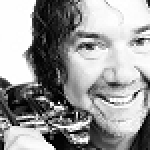WindWorks Trumpet Academy › Forums › WindWorks › falsetto?
- This topic has 3 replies, 3 voices, and was last updated 6 years, 1 month ago by
 fmaziers.
fmaziers.
-
AuthorPosts
-
-
5 June 2018 at 12:59 am #5237
 fmaziersParticipant
fmaziersParticipantHi Greg,
My professor explains that to play high, above E in the staff, we must think like singing a falsetto voice. What do you think about that? what’s going on when we do that? Its change the shape of the mouth? It’s change the pression in oral cavity?…
Kind regards. -
5 June 2018 at 9:07 am #5262
 Greg SpenceKeymaster
Greg SpenceKeymasterThis will all be explained in a lot more detail a little further down in the advanced section of the course.
My reply to that ideology is:
1. Can you sing falsetto?
2. What do people that sing falsetto feel like when they sing? Is it a consistent feeling across the board? I suspect not.
3. What do people that sing falsetto think they are doing when singing high? Are they correct?
4. Does the idea work for you? If so, then go with it. It may cause confusion.Above a high C (more like concert d or Eb but for arguments sake lets say high c), the instrument basically becomes an amplifier of the mouthpiece buzz. DON’T SHOOT ME! This if from physicists and instrument makers – however, do I teach people to buzz high c’s on their mouthpiece? No! Why? Too much negative tension creeps in.
I think it might be more of a psychological approach rather than a direct technical analogy?!
It is a SHAPE change by virtue of the fact that the tension of the vocal cords is changing but that is getting in to a very complex comparison.
I certainly wouldn’t go in to the pressure in the oral cavity area either. Does it change? Possibly. Should we work on increasing pressure? NO WAY!
-
8 June 2018 at 8:50 am #5753
 Ronald CarsonParticipant
Ronald CarsonParticipantTrained singers can use falsetto to sing higher without anyone hearing the voice is falsetto, especially using a microphone. There is a limit and you might just end up sounding like the Bee Gees.
The idea of falsetto is to not use excessive, unproductive tension and overblowing to play higher. It is an analogy that makes some sense, especially if you plan on “Stayin’ Alive” as a trumpet player.
So what does this have to do with you and playing brass?
Belt out the highest note you can sing. Then try to sing even higher; untrained singers tighten up, sing louder and strain their vocal cords.
Trumpet players do the same, instead of vocal cords we use lips and or the Valsalva maneuver. Some wrongly think that blowing harder, pressing the lips together and/or smashing the horn into your kisser will help develop a screaming upper register or any notes above the staff. BAD TECHNIQUE.
Thinking falsetto means you will relax and not use excessive force to get the notes out.
My suggestion is to stay with Greg, he is teaching the same idea and just not using the falsetto analogy to get there. It is the same path and same destination.
By the way, I have a reference for my writing. Bryan Davis, AirFlowMusic. He explains it on YouTube: https://www.youtube.com/watch?v=gUXeH5i1T7g and this is where I got my information.
-
9 June 2018 at 2:44 pm #5879
 fmaziersParticipant
fmaziersParticipantHi Carson,
That’s a great reply. Very clear!
I’m going to stay with Greg. It was just a question to understand how falsetto works.
Thanks a lot.
All the best.
-
-
AuthorPosts
- You must be logged in to reply to this topic.
Recent topics
-
Question of Curiosity – To Teeth or Not To Teeth
by
clawsonk123
1 month, 2 weeks ago -
1.O / 2.0 routine
by
jice.gif
2 months, 3 weeks ago -
Abdominal surgery and time off the trumpet
by
DQ
9 months, 3 weeks ago -
Allegro or Presto Practice Routine
by
djm297
10 months, 2 weeks ago -
Tongue lock – Throat lock
by
Ivo Carrabs
11 months, 1 week ago
